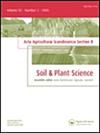利用全长16S rRNA基因测序,在拉脱维亚豆科结节中检测到α、γ和β变形菌群
IF 1.8
4区 农林科学
Q2 AGRONOMY
Acta Agriculturae Scandinavica Section B-Soil and Plant Science
Pub Date : 2023-07-15
DOI:10.1080/09064710.2023.2232681
引用次数: 0
摘要
本文章由计算机程序翻译,如有差异,请以英文原文为准。
Alpha-, gamma- and beta-proteobacteria detected in legume nodules in Latvia, using full-length 16S rRNA gene sequencing
ABSTRACT
Rhizobia are soil bacteria that form nodules on legumes and fix atmospheric nitrogen, reducing the need for chemical fertilisers. In most studies rhizobia are described as alpha-proteobacteria and have been studied extensively for several decades. However, in recent years an increasing number of studies present beta- and gamma-proteobacteria strains as potential rhizobia-like bacteria. In this study we identify bacteria isolated from nodules of various legumes grown in Latvia, using a full-length 16S rRNA gene sequence, used for more precision, compared with a partial sequence of the gene. Bacterial strains in this study have been isolated from 1962–2019, part of which are rhizobia strains from a unique historical collection. This is the first time bacterial strains isolated from nodules in Latvian soils have been identified with molecular biology methods. A wide taxonomic diversity was detected – bacteria species from α-, β-, γ-proteobacteria classes and Paenibacillus polymyxa strains from the Bacilli class. P. polymyxa strains were detected only in the historical collection, while β- and γ-proteobacteria strains were obtained only from the newly isolated specimens, uncovering new potential strains for a commercial legume seed inoculum. Soil samples were collected, and phosphorus levels were determined. Several strains indicate phosphate solubilising properties.
求助全文
通过发布文献求助,成功后即可免费获取论文全文。
去求助
来源期刊
CiteScore
4.40
自引率
0.00%
发文量
56
审稿时长
2.3 months
期刊介绍:
Acta Agriculturæ Scandinavica Section B publishes original research in applied soil and plant science with special attention given to to crop production in agri- and horticultural systems. We welcome manuscripts dealing with:
Climate smart and sustainable crop production systems
Water and nutrient efficiency
Soil conservation and productivity
Precise agriculture systems
Applications of bio- and nanotechnology
Digitalisation and robotics
Soil-plant interactions
Acta Agriculturæ Scandinavica, Section B – Soil & Plant Science forms part of a series of titles published on behalf of the Nordic Association of Agricultural Science (NJF). The series also includes Section A - Animal Science .

 求助内容:
求助内容: 应助结果提醒方式:
应助结果提醒方式:


